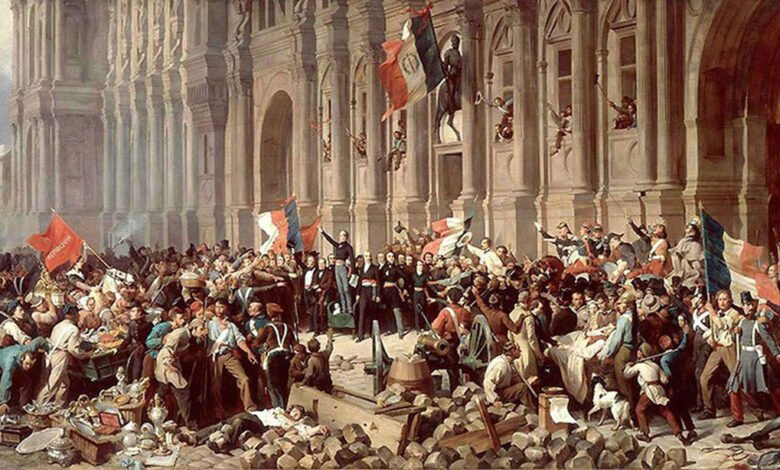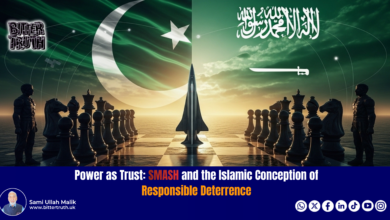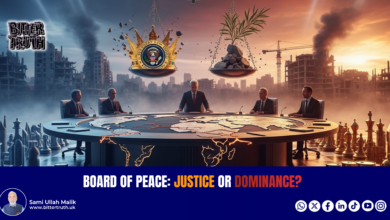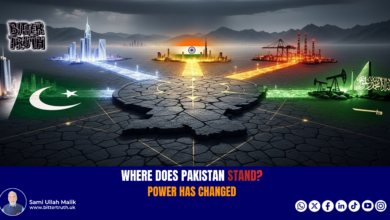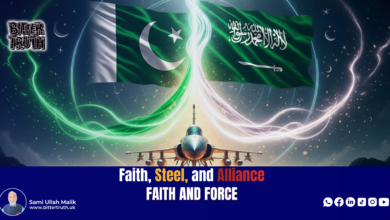Bloody Revolution and Today’s Pakistan
The identity of France is Paris, and the soul of Paris is John Shazley Lazey. John Shazley Lazey is the most beautiful and expensive avenue in the world. This road was built by French kings centuries ago for their processions. It was meticulously crafted by French craftsmen, who laid each small stone, and these stones still stand today. Champs-Élysées is also known as the world’s first fashion street. Along this road, on both sides, there are showrooms, restaurants, cafes, and stores of the most expensive brands in the world. This road begins from the “Place de la Concorde”This is the world’s largest obelisk, with a cone-shaped column at its exact centre. This column was carved by Egyptian craftsmen thousands of years ago during the rule of Pharaoh Ramses. It was the same Pharaoh who claimed divinity during the time of Prophet Moses. In his confrontation with Prophet Moses, he and his army were engulfed by the waters of the Nile River. When this column was complete, the craftsmen engraved on it the power, authority, and institutional reforms of the great king Ramses. Undoubtedly, Pharaoh must have been pleased with this proclamation, and he had this column erected before his palace. However, time changed. In October, Pharaoh’s fate turned against him. He and his kingdom both crumbled, and all his power, authority, and courtly commands were reduced to dust, buried in the sands of the palace courtyard.
In the 19th and 20th centuries, ancient Egyptian artifacts were discovered in the Egyptian deserts, and this column was also found lying in a corner. This column witnessed the transformation of Egyptian rule over a long period. During the official tour of Egyptian King Muhammad Ali Pasha in Paris, this column was brought along, and it was presented as a gift to King Louis. The King placed this column in the largest square of Paris and named the square after Napoleon, “Place de la Concorde”. The column still stands here to this day, and all the inscriptions carved on it in ancient Egyptian language are preserved just as they were five thousand years ago. These inscriptions were created by various individuals over the course of history, including the likes of Mian Brothers, Mashraf, Zardari, Pervez Ilahi, Maulana Fazlur Rahman, Bajwa, Imran Khan, and some judges of the Pakistani judiciary, and others.
However, it is unfortunate that the linguists of the world have not been able to decipher the language of Concord, known as “The Code,” yet. But I am convinced that if the world ever understands the language of Concord, it will be something like this: “We grant you the authority to shed blood at the Palace of Power, and we also permit amendments to the constitution, and the country’s politicians will repeatedly chant this slogan to prove their loyalty, that the King should be elected in the Universal Form, the President is allowed to hold both positions, and the President can seek a vote of confidence from the present assemblies for the second time,” and so on.
In the next paragraph, we will adorn and embellish our old country with new leadership. Alongside providing employment for countless individuals, we will construct 5 million houses. Instead of seeking further loans for the country, I will prioritize austerity, and for the sake of the nation’s economic difficulties, I will bring back a capital of 200 billion dollars from abroad. As we assume power, we will hold true to all our promises, confronting the exploitative global financiers, and in the face of their demands, we will rescue the citizens who were drowning in existing debts. Those who were already burdened with loans will now face the curse of additional exploitative loans. As criticism began, I demanded from these individuals that they fulfil the promises made in my manifesto and those made to the people. I insisted that all these critics should be sent to jail for embezzlement and for transferring the nation’s wealth abroad during their own administrations. In the face of ongoing inflation, excessive speculation, unemployment, and the removal of promises made to the people, day and night, I continued to blame all the corruption and disasters on the opposition, while portraying myself as innocent.
Like any other oppressive ruler, he also got engrossed in his elaborate plan to maintain his power, and as always, he put his feet on the shoulders of his benefactors while striving to advance. This time, however, he managed to save himself from making a wrong move in the chess of power, and he cleverly avoided falling into the “checkmate” of power. He used his “pawn” to stop the impending downfall of those individuals who had lived a lifetime deprived of power and had been subjected to the dominance of others in the game of power, turning them into mere pawns in his grand scheme. The vengeful and scheming political adversaries, in their pursuit of revenge, have employed various tactics to nullify the legislations, erasing any traces of their past accomplishments. Despite seeking assistance from his external allies during these challenging times, his efforts proved in vain.
In the country, comprehensive planning is underway to expand his power, but he will only sit on the throne of power with the confidence of completely transforming all his past deceptions into absolute loyalty.
At the second boundary of the John Shanzey Lazey, there is the “Arc de Triomphe,” a twelve-arch building, but it has only four doors. It was built in commemoration of the conquests and successes of the Bonaparte Party. In the exact centre of this building, there is an unknown soldier’s tomb, and a torch is lit in hismemory. This torch has been burning continuously since the previous century, and all the French soldiers have gathered at this site, removing their hats and saluting those who had sacrificed their lives for their country in the first Great War. This location now symbolizes another kind of freedom.Paris’ twelve major roads start from this arc, and these roads include the Highway of Democracy.
History tells us that in the late eighteenth century, during the French Revolution, the revolutionaries erected a guillotine at this location, and daily, 150 nobles, rulers, and politicians were brought here to face the blade of the guillotine. Revolutionaries used to gather at various points around Paris, targeting anyone whose hands appeared soft, whose body carried the fragrance of perfume and soap, and who had recently taken a fresh bath. They would prevent them from reaching the site, file charges against them in the local court, and execute them by beheading under the guillotine. When I arrived at this site, I couldn’t help but feel that even today, under the Arc de Triomphe, the blood of France’s aristocracy, which had once made bread unaffordable for the common people, was present. It had permitted influential circles to indulge in extravagant pleasures and imposed restrictions on the people’s protests.
This was a dark era in France’s history, where all ruling authorities were military heads, and the king, through hefty bribes, kept changing his government officials, allowing them to construct neighborhoods in the outskirts of Paris. The king summoned his treasury and brought the officials, instructing them to build palaces. The treasury minister manipulated the funds, and the common people’s blood was shed to build magnificent palaces. These palaces are still standing today; they are called the Châteaux de la Monarchie and emit the smell of the people’s blood from their walls. You might be astonished to know that the foundation of the French Revolution was based on a court decision. In the late eighteenth century, when people had no flour left and were ready to revolt, the queen of the country, instead of providing them with bread, handed them cakes. At that moment, in front of the palace, people started to raise their arms and shout, and a monarchical regime turned into a republic. The court decision stated that in the late eighteenth century when people had no flour left and were ready to revolt, the queen of the country, instead of providing them with bread, handed them cakes. At that moment, in front of the palace, people started to raise their arms and shout, and a monarchical regime turned into a republic.
At the time when people were struggling for flour in the streets of Paris, it was at this moment that the Local Court of France declared that the king possesses all the authority in his own right and no power in the world can take away these powers from him. According to this decree, the next day, a confused subject of the king began throwing stones at the location of the “Arc de Triomphe.” People intervened and found a royal decree in his pocket. According to this royal decree, the royal subjects were empowered to punish anyone at any position against whom there was a suspicion of a threat to peace. This subject of the king couldn’t bear the blows of the royal decree, and in front of the people, he slapped himself on the head with it. In a fit of rage, he insulted the crowd and five minutes later, his lifeless body lay under the Arc, the first victim of this revolution. It is understood that even despots are ultimately human, and no iron curtain separates their lives and deaths from those of ordinary people. That day and today, the Day of Judgment, in France, no one has attempted to replicate the “Concorde.”
I stood on the roof of the ‘Arc de Triomphe,’ with the John Shanzey Lezay spread beneath my feet. I bathed in the lights of the entire Paris, a city beautiful and steeped in mystery. The remnants of a crimson sunset still lingered on the horizon. I took a deep breath of the cool Parisian evening air and pondered: What sets France apart from Pakistan? This question arose in my mind, prompting me to consider how the current mindset of society can be transformed. Pakistan inherits the legacy of the British era’s civil service. It was designed by the British for their colonial rule, but neither can it be reformed nor have the politicians played any worthy role in it. Present-day Pakistan is not positioned to compete on a global scale economically, to the extent that it can’t even contend with the societal indicators within the region.
The derogatory terms commonly used by the elite for the common citizens reveal the rift between the state and its people. There is a need for a well-structured social contract between the state and its citizens, equally binding for rulers, elites, and commoners. It is often stated that Pakistan has seen more military rule throughout its history, but it’s also true that the periods of civilian governance have witnessed exponential growth for the country.
An element of China’s success is that there are more skilled individuals in governance. So much so that China’s current president is a chemical engineer. Meritocracy was closely observed during British rule. Now we have political appointments and political constraints for all government employees. Among us, the perception prevails that respect in society lies in the accumulation of wealth, and in pursuit of this desire, there is no distinction between right and wrong. Even government employees are not exempt from this pursuit of wealth. After the “search for dollars,” what expectations can we have of qualifications, integrity, hard work, and the decisions based on merit? Hence, there is a need to change society’s mindset, but we claim to bring about this change. However, as soon as we reach positions of power, we begin to consider ourselves kings and the people as our hereditary slaves.
I feel that Pakistan has become the France of 1780. The same issues, the same oppression, the same tyranny, the same greed for acquiring more power, the same self-interest and flattery, the same politicians, laws, and regulations being disrespected, the same cruelty, the same injustices, the same stubbornness and false sense of indispensability, the same arrogance, the same cries for Allah’s proximity, and the same self-deception – the people’s restlessness, the same restlessness, the same anger, and the same intensity, the same inflation, the same unemployment, and the unattainability of basic necessities like flour and lentils.
The media’s manipulation and the open use of the police, the system’s failures, the distrust in the courts, the politicians’ distribution of patronage, the same deals and the same compromises, the same company of monarchs, and the same sycophancy. I feel that Pakistan is standing at the brink of a bloody revolution. O my Lord! Your mercy is needed. Save my sacred land from further destruction and grant us rulers who have the same vision as was seen at the time of Pakistan’s establishment. Amen.

